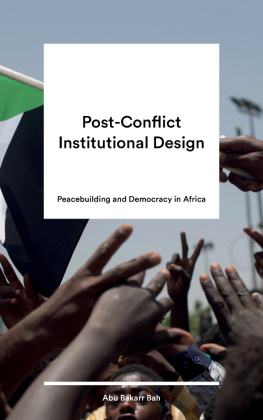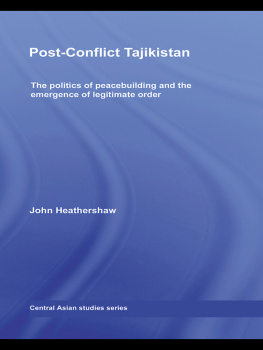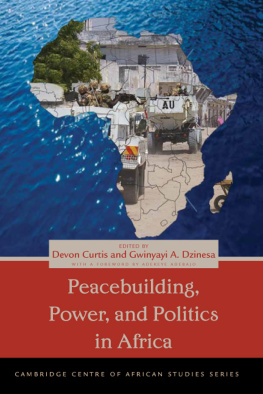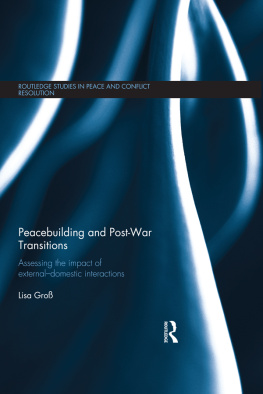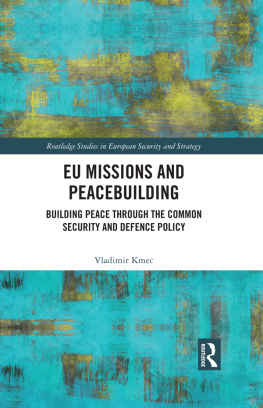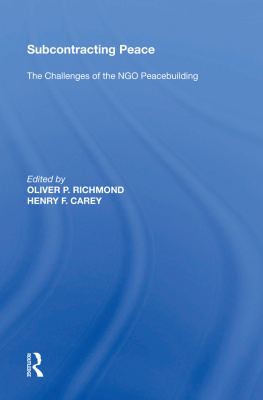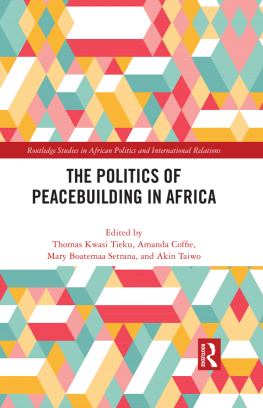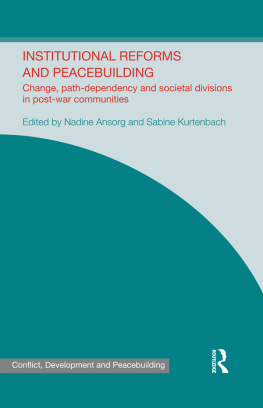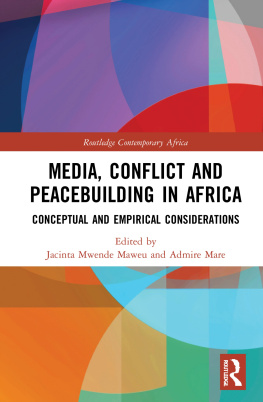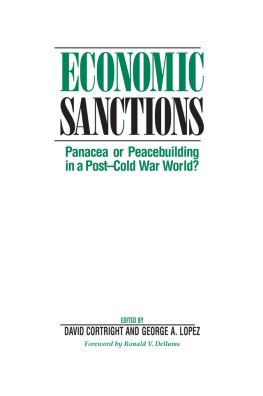POST-CONFLICT INSTITUTIONAL
DESIGN: PEACEBUILDING AND
DEMOCRACY IN AFRICA
Edited by Abu Bakarr Bah
Post-conflict Institutional Design: Peacebuilding and Democracy in Africa was first published in 2020 by Zed Books Ltd, The Foundry, 17 Oval Way, London SE11 5RR, UK.
www.zedbooks.net
Editorial Copyright Abu Bakarr Bah, Copyright in this Collection Zed Books
The right of Abu Bakarr Bah to be identified as the editor of this work has been asserted by him in accordance with the Copyright, Designs and Patents Act, 1988
Typeset in Plantin and Kievit by Swales & Willis Ltd, Exeter, Devon
Index by Molly Reinhoudt
Cover design by Burgess and Beech
Cover photo David Rose/Panos Pictures
Printed and bound by CPI Group Ltd (UK), Croydon CR0 4YY
All rights reserved. No part of this publication may be reproduced, stored in a retrieval system or transmitted in any form or by any means, electronic, mechanical, photocopying or otherwise, without the prior permission of Zed Books Ltd.
A catalogue record for this book is available from the British Library
ISBN 978-1-78699-790-6 hb
ISBN 978-1-78699-789-0 pdf
ISBN 978-1-78699-787-6 epub
ISBN 978-1-78699-788-3 mobi
To my wife, Rugiatu Bah, and children (Manmadu, Ibrahim, and Aisha) for the love, joy, and enrichment they bring to my work and life.
CONTENTS
Abu Bakarr Bah
Niklas Hultin
Okaka Opio Dokotum
David Mwambari and Iris Nxumalo
Michael D. Beevers
Aditi Malik
Abu Bakarr Bah and Fredrick Ogenga
is Professor of Sociology at Northern Illinois University and Faculty Associate at the Center for Nonprofit and NGO Studies. He is also Editor-in-Chief of African Conflict & Peacebuilding Review . He is also African Editor for Critical Sociology .
is Associate Professor of Environmental Studies at Dickinson College, Carlisle, PA.
is Associate Professor of Literature and Film and Deputy Vice-Chancellor (Academic Affairs) at Lira University, Uganda.
is Assistant Professor of Global Affairs at George Mason University, Fairfax, VA.
is Assistant Professor of Political Science at College of the Holy Cross, Worcester, MA.
is an FWO postdoctoral research fellow at the Department of Conflict and Development Studies at Ghent University in Belgium and an adjunct faculty at the African Leadership Centre (ALC) in the Faculty of Social Science and Public Policy at Kings College London.
is Innovation Manager for Nurturing, an Innovative and Inclusive Society strategy at the DG Murray Trust and a Zanele Mbeki Fellow (20182019).
is Associate Professor of Communication and Director of the Centre for Media, Democracy, Peace and Security at Rongo University, Kenya.
Abu Bakarr Bah
Introduction
Since gaining independence from colonial rule, most African countries have been struggling to build democratic and peaceful states. In most cases, these have not yet been achieved. Too often, African countries are plagued by dictatorships or multiparty politics that generate major political violence, and in worst cases civil war. At independence, African countries struggled with the multiparty political systems that emerged at the end of colonial rule. While those multiparty political system may be viewed as democratic systems of governance, in reality they were beset by ethnic and regional political grievances that made meaningful democracy very problematic. As Claude Ake clearly pointed out, democracy never took hold in Africa. In fact, the seeds of one-party dictatorships, coups, and ethnically driven civil wars were planted right after independence. While it would be simplistic to reduce African political conflicts to ethnicity and regionalism, there is a vivid pattern of political conflicts often revolving around ethnic and regional identities. Indeed, even though ethnicity and regionalism are not the only reasons for political violence, as often pointed out in the greed-grievance literature, they are key instruments for mobilization and organizing political violence in the service of elite interests. In this sense, ethnicity and regionalization have always been at the center of political conflicts in Africa.
In West Africa for example, the early democracies were plagued by ethnic violence and quickly degenerated into one-party or military regimes. In Nigeria, the regional and ethnic political competition for power that pitted northerners against southerners, meshed with intermittent conflicts among Hausas, Igbos, and Yoruba, led to a series of coups and the Biafran War. In Sierra Leone too, the supporters of the southern-dominated Sierra Leone Peoples Party (SLPP) and the northern-dominated All Peoples Congress (APC) engaged in major political violence and coups, which culminated in the introduction of one-party rule and the political marginalization of Mende people. Similar problems emerged in Ghana and Liberia. Francophone countries also experienced political violence and ethnic marginalization, which resulted in one-party rule. In particular, Guinea was a notorious case of ethnic polarization and brutal dictatorship. Even relatively well managed Cte dIvoire fell victim to the legacies of one-party rule and ethnic marginalization under Flix Houphout-Boigny.
In Eastern and Central Africa too, the early democracies were beset by political violence in which ethnic and regional groups were pitted against one another. In Kenya for example, ethnic political violence over control of the state and land issues were common especially among major ethnic groups and in the Rift Valley. Similar problems existed in countries such as Uganda and Burundi. In Sudan and Ethiopia, ethnic and regional politics lead to bitter separatist wars. Even after the secessions of South Sudan and Eritrea, the problems still persist in those countries. In all of these countries, multiparty democracy became plagued by violence paving the way for the cynical imposition of de jure or de facto one-party rule, which led to further political violence in the 1990 s. In the case of Rwanda, ethnic politics culminated in a genocide.
Even in countries where major political violence is attributed to much broader national struggles, there are instances of identity politics. In the case of South Africa, where race was the central driver of oppression and political violence, significant levels of violence emerged between the Zulu-dominated Inkatha Freedom Party and the African National Congress (ANC), which was heavily supported by Xhosa people. In addition, native people in South Africa have been marginalized by both White rule and Black political movements. In Somalia, clan politics degenerated into political violence in ways that are akin to the conflicts in Liberia and South Sudan. In Zimbabwe, the bitter struggle over White rule and Mugabes grip on the country masked some of the ethnic political grievances in the country. However, as the Mugabe regime waned, ethnic political grievances became more prominent.
Given the salience of ethnicity and regionalism in African multiparty politics and the persistence of political violence along ethnic lines, this work raises critical questions about the design of political institutions and the challenges of building peaceful democracies. Too often, African political conflicts have been attributed to poor leadership, greed, corruption, dictatorship, and external interference. A key assumption in these kinds of critiques is that democratic rule can resolve most of the problems by holding leaders accountable to the people through the electoral process and the rule of law. This was a key argument that was advanced during the democratic transitions of the 1990 s aimed at ending one-party and military regimes in Africa. What was often left out in that debate was the fact that multiparty democracy failed to promote peace during the immediate post-independence period. Driven by neoliberal economic and governance policies, the democratic reforms of the 1990 s confounded the principles of democracy with the mechanism of democracy. Too often, simple multiparty electoral systems were seen as sufficient to produce peaceful democracies. Roughly two decades after the second wave of democracy, African countries have again been plagued by multiparty political systems that produce political violence. In Cte dIvoire, multiparty politics degenerated into a civil war as ethnic and regional identities were manipulated by the elite. In Kenya, multiparty elections produced major violence in 2008 and continue to be marred by violence and stalemates. Similar problems have emerged in countries such as Togo, Gambia, Sierra Leone, Guinea, and Uganda. A critical issue that still needs to be addressed is whether the mechanism of winner-takes-all neoliberal multiparty democracy contributes to political violence.



